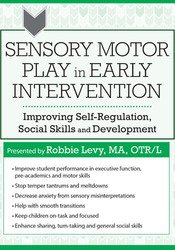

Join Robbie Levy, MA, OTR/L, and discover how sensory, motor and play activities impact self-regulation, social skills and development. Learn cutting-edge, brain-based information and techniques for kids who exhibit the following behaviors:
Through lecture, experiential activities, group and individual case studies, video and picture demonstration, you will come away with a “tool-box” full of activities and resources. Get your kids on a more powerful path to self-regulation and typical social and motor development!
This online program is worth 5.75 hours CPD.
| File type | File name | Number of pages | |
|---|---|---|---|
| Manual (1.07 MB) | 49 Pages | Available after Purchase | |
| Manual - French (1.07 MB) | 49 Pages | Available after Purchase | |
| Manual - Italian (1.07 MB) | 49 Pages | Available after Purchase |
Robbie Levy, MA, OTR/L, is an occupational therapist with over 33 years of experience specializing in pediatrics and is the owner and director of Dynamic Kids, a large, well-respected OT, PT, SLP practice devoted to addressing a variety of sensory, motor, behavioral, social and academic issues in children from birth to adolescence. Dynamic Kids is partnering with NYU to do research on the impact of heavy work protocols on executive function in preschool children with sensory processing disorders. Actively involved in many industry associations, Ms. Levy’s passion and expertise is called upon repeatedly both nationally and regionally by therapy, education and parent groups such as AOTA, NYSOTA, Young Child Expo, Child Care Council and countless others. Her expertise and passion working with children and families is sought after for presentations and consultations in the following areas: sensory integration/sensory processing, motor development, the role of occupational therapy in school-based therapy, handwriting development, assistive technology as well as private practice issues.
Ms. Levy is a past professor at NYU in the Department of Occupational Therapy teaching pediatrics and advanced professional seminars in Developmental Disabilities. She has many advanced trainings and certifications including SIPT, Therapeutic Listening, NDT, Handwriting without Tears, Wilbarger Protocol, How Does Your Engine Run, Benbow and DIR-Floortime. Ms. Levy is honored to be a recipient of the 2015 award from Westchester Woman of Influence. She received her BS in occupational therapy from the University of Pennsylvania and her Advance Masters in developmental disabilities from NYU. Ms. Levy is the author of the blog, “Ask the Expert ”.
Speaker Disclosures:
Financial: Roberta Levy is the Director/Owner of Dynamic Kids, Inc. She is the author of the Dynamic Kids Ask the Expert blog. She receives a speaking honorarium from PESI, Inc.
Non-financial: Roberta Levy has no relevant non-financial relationship to disclose. She has no relevant financial relationships with ineligible organizations.
Course Content Disclosure: ASHA Position Policy states that Auditory Integration Therapy (AIT) has not met scientific standards for efficacy that would currently justify its usage.
| 5 |
|
| 4 |
|
| 3 |
|
| 2 |
|
| 1 |
|
Satisfaction Guarantee
Your satisfaction is our goal and our guarantee. Concerns should be addressed to info@pesi.co.uk or call 01235847393.
Please wait ...